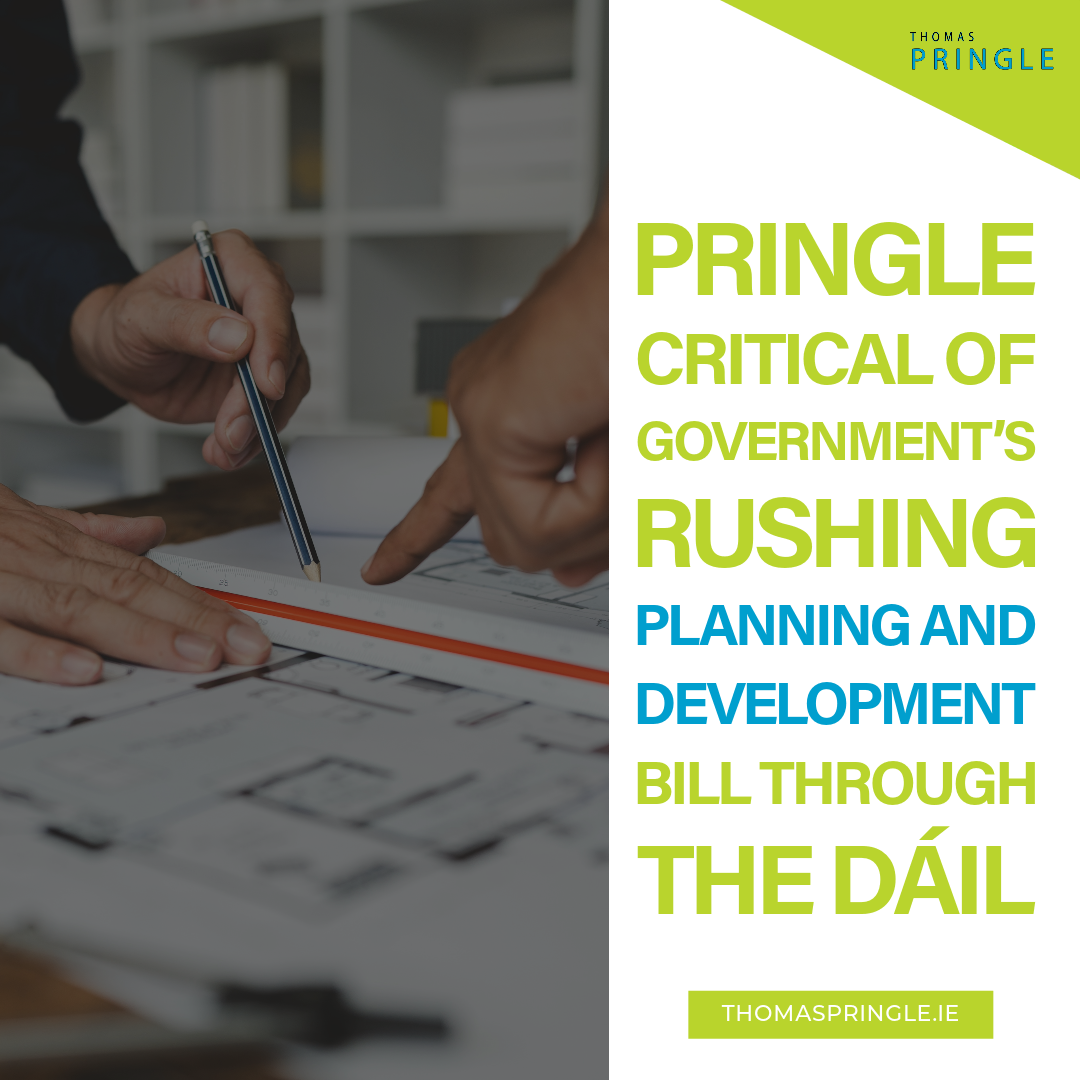- Pringle: We need a policy that recognises the importance of inshore fishing
- Pringle: Disabled people and carers face crisis of State neglect
- Pringle: Failed FF/FG housing policies forcing people to put their lives on hold
- Pringle welcomes Donegal council motion on Occupied Territories Bill: ‘We cannot stand by in the face of genocide’
Pringle critical of Government’s rushing Planning and Development bill through the Dáil
- Updated: 9th December 2023

Independent TD for Donegal, Thomas Pringle, criticised the Government’s rushing through the lengthy Planning and Development Bill, as he raised concerns over a lack of consultation and other provisions.
Addressing the Dáil on Wednesday evening, Deputy Pringle said: “What continues to come out in relation to this bill is that it is rushed and maybe deliberately complicated as well. We are hearing now that the explanatory memorandum does not even comply with the bill, which I believe is shocking.” The deputy said that time for debate will also be shortened.
Deputy Pringle said: “For a bill that has taken so long and is so complicated and allegedly so important for the workings of our State, I think it’s a really disrespectful step to make sure it goes through in such a rushed process.” He called on the Ceann Comhairle to clarify whether the bill complies with standing orders.
The deputy was speaking on Planning and Development Bill 2023.
Deputy Pringle said: “The consultation on the actual bill is fairly lacking. The Community Law and Mediation and the Environmental Justice Network Ireland have stated that they were ‘disappointed that the bill has proceeded to Cabinet without prior inclusive public consultation, indicating a weak commitment to genuine democracy’.” He said Fórsa, which represents workers at An Bord Pleanála, said there was no consultation with staff in relation to provisions in the bill that apply directly to them.
Deputy Pringle rejected suggestions that attribute planning delays to An Bord Pleanála and the courts. He said a recent letter to The Irish Times outlined “that of 297,000 planning applications made in the last 11 years less than 7% have been appealed to An Bord Pleanála and less than 3% of that 7% have been taken to judicial review. This amounts to 0.04% of all planning applications and 3% of those on appeal.”
The deputy said: “How can the proliferation of judicial reviews be causing the delays in the planning cases?” He said housing is delayed when developers sit on properties with planning permission looking to capitalise on the value of the land, not because of An Bord Pleanála, “and not because of appeals by communities who are concerned about what’s happening in their communities.”
Deputy Pringle said: “We should be welcoming communities to be involved in the process rather than trying to restrict them.”
“There is no doubt that this is all about restricting the public’s access to the courts and to justice,” he said.
The deputy said: “The costs provisions in Part 9 of the Act clearly are an attempt to stifle those solicitors who help communities bring the limited number of cases that are brought to the courts as it is. It is proposing to move cost hearings away from the Office of the Legal Costs Adjudicator – who know whether costs are fair and reasonable – to an appointee of the Minister and all that entails.
“That is the aim of the industry/political lobby groups who do not want to be accountable to the courts and legal process that us mere mortals have to live under. There is also the question of whether the changes in relation to the cost provisions could actually create a precedent in relation to legal costs in general and therefore there is a genuine question about the legality of the provision at all and that will probably be tested in the courts as well,” he said.
The deputy also questioned a number of other provisions in the bill, including one related to exempted development that he said would reduce oversight, and others he said needed clarity.
Concluding his remarks, Deputy Pringle said: “And I think that’s the difficulty of the complicated legislation that we have, and we’re expected just to accept it and rubberstamp it and pass it.”



